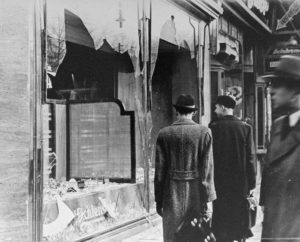9 November 1938: The November Pogrom (Kristallnacht)
On 9 November 1938, the Nazis initiated a campaign of hatred against the Jewish population in all Nazi territories. An estimated 91 Jews were killed, 30,000 arrested and 267 synagogues destroyed. Many shops and other Jewish businesses were destroyed and looted.

Kristallnacht © USHMM
The November Pogrom was formally known as Kristallnacht (the Night of the Broken Glass), named after the smashed glass that covered the streets, from the windows of shops and synagogues that had been looted, burnt and vandalised during the attacks.
It was a night of vandalism, violence and persecution that many have since described as ‘the beginning of the Holocaust’.
Survivor Albert Friedlander recounts his experience in Berlin after the November Pogrom (Kristallnacht):
‘There was a lot of glass on the streets. We lived in the West End, surrounded by shops, many of them Jewish. This was late at night and it was dark; but we had no trouble in picking out the Jewish shops. They had been looted, the windows had been smashed, and there were ashes, rubble and debris outside some of the shops. We had not seen how our fellow Jews had been treated: beaten, taken to prison, some of them never to return. But in our hiding place, listening to our friends, we heard more and more of the story of Kristallnacht.’


